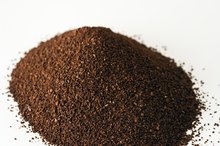Magnesium & Coffee
Magnesium is a key mineral involved in a number of reactions in your body. Drinking coffee can lead to a deficiency of this nutrient. As both the acid and caffeine in coffee affect how your body absorbs magnesium, drinking decaffeinated and de-acidified coffee may help reduce the impact on your body's mineral balance.
Magnesium
Magnesium only makes up 0.05 percent of body weight, but it is an extremely important mineral. It is involved in hundreds of reactions, including those responsible for heart function and energy production. It activates enzymes involved in carbohydrate and protein metabolism and is required for DNA production and function. About 65 percent of the body's magnesium is found in bones and teeth. The rest is found in the brain, blood, other fluids and the heart.
- Magnesium only makes up 0.05 percent of body weight, but it is an extremely important mineral.
- It is involved in hundreds of reactions, including those responsible for heart function and energy production.
Effects
Can Drinking Coffee Cause Dry Mouth?
Learn More
The diuretic and mild laxative effects of caffeine in coffee result in the loss of minerals, including magnesium, via the urine and feces. Additionally, the acid present in coffee wears away at the villi of the small intestine, reducing its ability to absorb nutrients, which is why most heavy coffee drinkers have mineral deficiencies, according to Paul Pitchford.
Symptoms
Insomnia, muscle twitching or tremors, fatigue, irritability and anorexia can all be early signs of magnesium deficiency. Psychologically, a person might experience confusion, poor memory, apathy, anxiety and a decreased learning capacity. A moderate deficiency can cause a rapid heartbeat, while more severe cases can lead to problems with muscle contraction, numbness, tingling, delirium and hallucinations. Kidney stones and other tissue calcification are more likely with magnesium deficiency, as well as high blood pressure and arterial spasms that can lead to heart attack, in worst-case scenarios.
- Insomnia, muscle twitching or tremors, fatigue, irritability and anorexia can all be early signs of magnesium deficiency.
- A moderate deficiency can cause a rapid heartbeat, while more severe cases can lead to problems with muscle contraction, numbness, tingling, delirium and hallucinations.
Options
Caffeine & Magnesium
Learn More
The steam-processed version of decaffeinated coffee is the healthiest choice of decaffeinated coffee. De-acidified coffee, made using a cold-water method, is also available at many supermarkets. However, you can make acid-free coffee at home by leaving 1 pound of freshly ground organic coffee and 8 cups of cold water to soak in a cool, dark corner for 16 hours. Filter the liquid and use it to make your morning cup of coffee.
- The steam-processed version of decaffeinated coffee is the healthiest choice of decaffeinated coffee.
- However, you can make acid-free coffee at home by leaving 1 pound of freshly ground organic coffee and 8 cups of cold water to soak in a cool, dark corner for 16 hours.
Related Articles
References
- "Healing with Whole Foods: Asian Traditions and Modern Nutrition"; Paul Pitchford; 2002
- "Staying Healthy with Nutrition: The Complete Guide to Diet and Nutritional Medicine"; Elson Haas, M.D.; 2006
- Coffeeresearch.org: Coffee Consumption Statistics in the United States
- Coffee consumption and health: umbrella review of meta-analyses of multiple health outcomes
- Coffee consumption and health: umbrella review of meta-analyses of multiple health outcomes
- Impact of coffee components on inflammatory markers: A review - ScienceDirect
- Coffee consumption and health: umbrella review of meta-analyses of multiple health outcomes
- Impact of coffee components on inflammatory markers: A review - ScienceDirect
- Coffee consumption and health: umbrella review of meta-analyses of multiple health outcomes
- Consumption of coffee or caffeine and serum concentration of inflammatory markers: A systematic review - PubMed
- Associations of coffee drinking with systemic immune and inflammatory markers
- Effects of coffee consumption on subclinical inflammation and other risk factors for type 2 diabetes: a clinical trial - PubMed
- Consumption of coffee or caffeine and serum concentration of inflammatory markers: A systematic review - PubMed
- Consumption of coffee or caffeine and serum concentration of inflammatory markers: A systematic review - PubMed
- Coffee consumption modulates inflammatory processes in an individual fashion - PubMed
- Chronic Inflammation - StatPearls - NCBI Bookshelf
- Consumption of coffee or caffeine and serum concentration of inflammatory markers: A systematic review - PubMed
- Coffee consumption and health: umbrella review of meta-analyses of multiple health outcomes
Writer Bio
Noura Eleid, a licensed acupuncturist in Oregon, has been writing professionally since 2010. She holds a Master of Science in traditional Chinese medicine from the American College of Traditional Chinese Medicine and a Bachelor of Science in physics from the University of Arizona.









